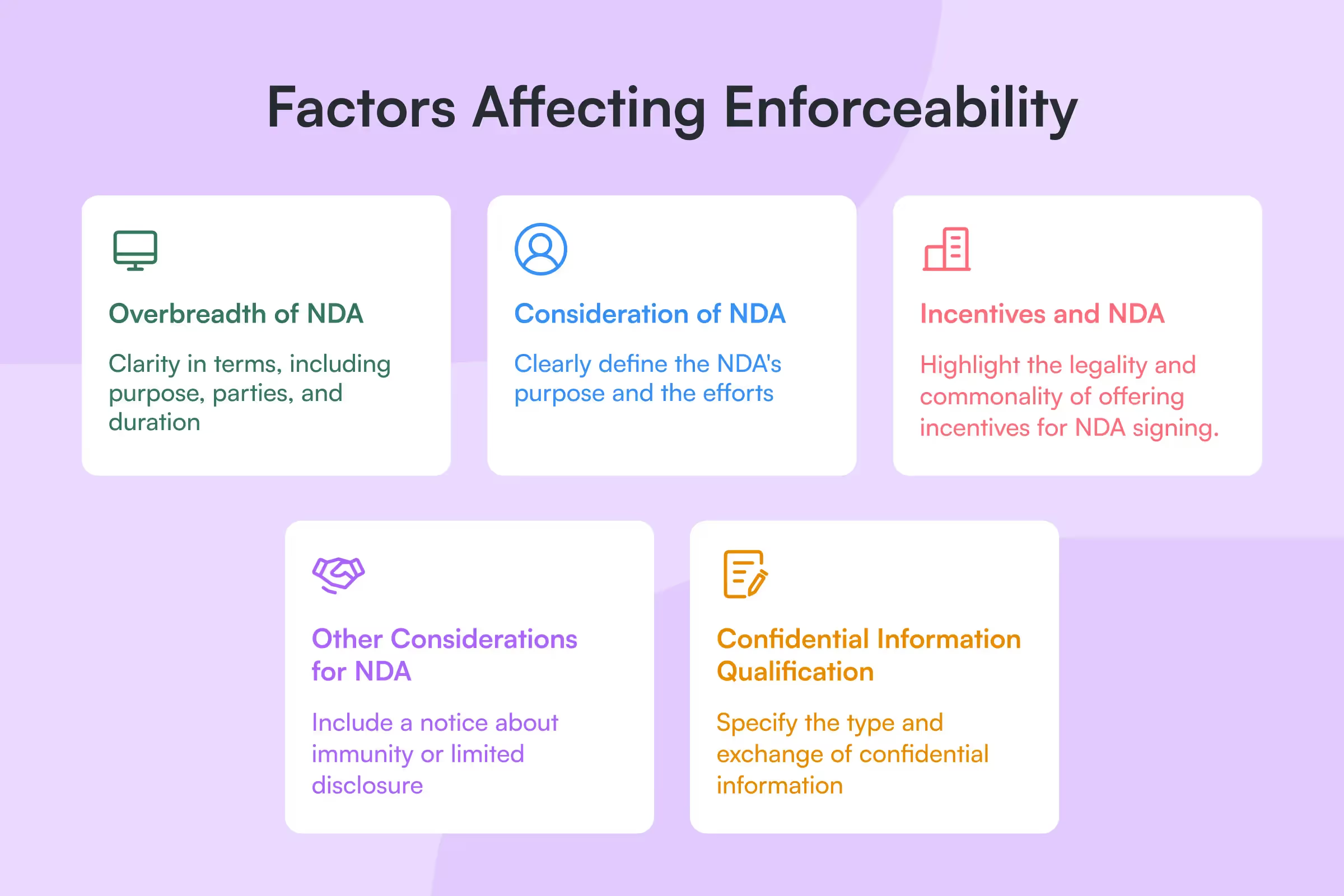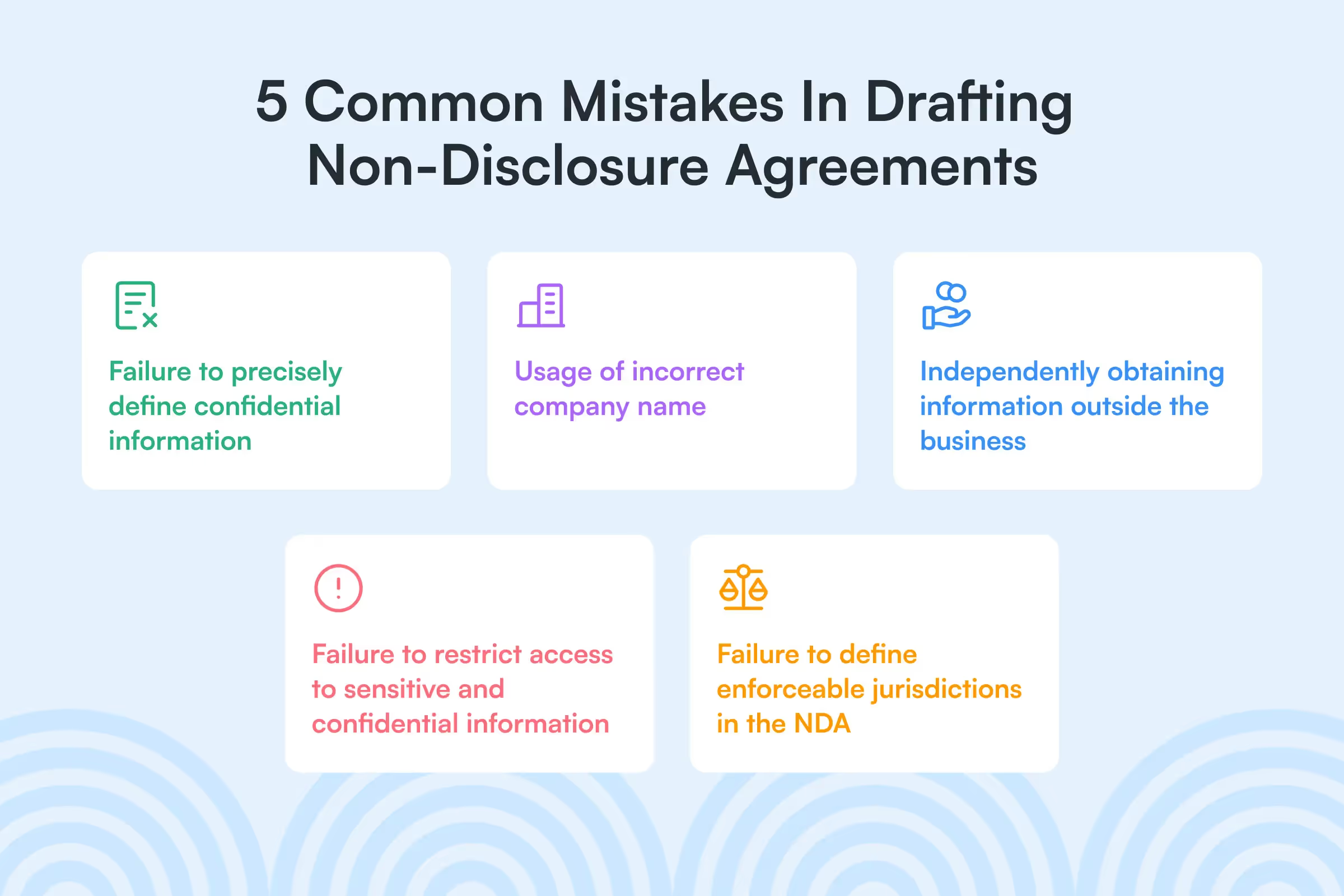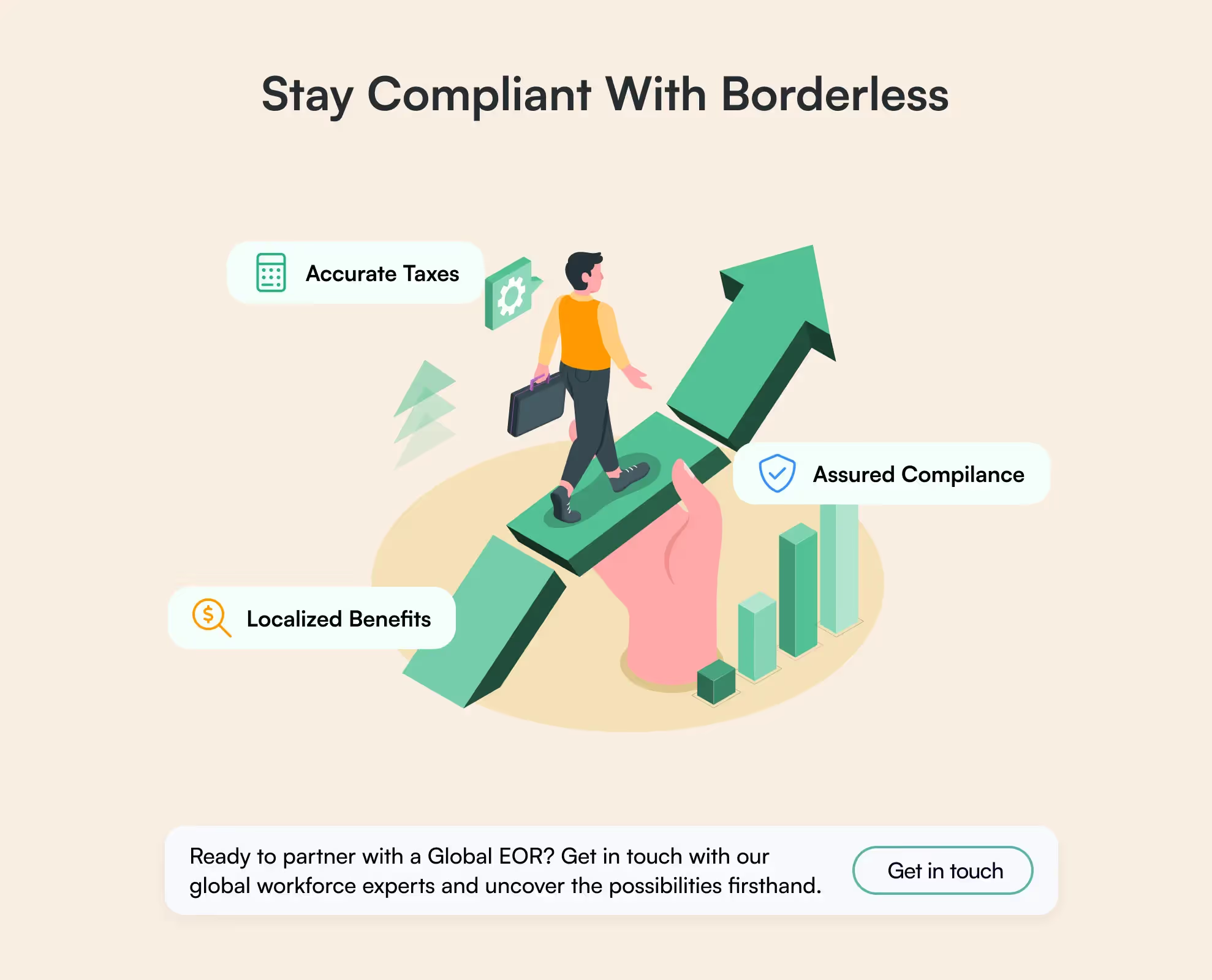Non-disclosure agreements (NDAs) are commonly used in business transactions to protect sensitive information from being disclosed to third parties. However, the enforceability of NDAs can vary depending on the jurisdiction. In the United States, California's NDA laws have been a topic of much discussion.
What makes a non-disclosure agreement in California enforceable or not? How does this affect other employment agreements, such as a separation agreement, settlement agreement, severance agreement, or confidentiality agreement? What happens at the state and federal level? These are all important things to know when you are hiring employees in California.
For employees, you may be wondering, should I sign such agreements? There’s been a lot of controversy as to whether signatories have enough access to legal counsel or knowledge prior to signing.
If your business relationship agreements fail to follow California NDA laws, you could put your company at unnecessary compliance and confidentiality risk. Therefore, it is important to be compliant with California law and keep confidential information about your business safe.
Today, over a third of Americans are bound by NDAs. However, keeping up with the latest developments in NDA law can be time-consuming.
Confused about NDAs but hiring in California? If you're an employer who wants to know more about the validity and use of non-disclosure agreements in the Golden State, here's everything you need to know.
What Is a Non-Disclosure Agreement?
A non-disclosure agreement is a legally binding confidentiality agreement. Bound by an NDA, signatories can't disclose information related to business interactions that is considered confidential. NDAs are designed to protect patents and sensitive information from third parties outside the agreement, especially competitors. This protects the company from potential threats, damage, or harm.
.avif)
NDAs cover confidential proprietary or sensitive information such as:
- Trade secrets (i.e. marketing strategies, manufacturing processes, computer software, etc.)
- Customer and supplier data
- Negotiations with other businesses
- Algorithms
- Accounting data or business plans
- Intellectual property or physical inventions
NDAs are signed before any kind of work relationship begins, unlike most other agreements related to a person's employment contract. This could even take place before hiring or interviews in the United States. Companies can require new employees and job interviewees to sign NDAs to keep sensitive information private.
For example, a sales or marketing engineer could sign an NDA that prevents them from taking any customer data to another employer or starting their own business. Similarly, software engineers working on proprietary algorithms could also sign an NDA that prevents them from discussing the algorithm or what they have learned with competitors. This is certainly another factor to take account in addition to costs when hiring in the US, and in California.
What Is the Difference Between NDAs, Confidentiality Agreements (CDAs), and Non-Compete Agreements?
A confidentiality agreement (CDA) differs slightly from an NDA. An NDA is a type of CDA; however, two or more parties typically sign a CDA to keep information learned or exchanged during their business interaction confidential.
An NDA, on the other hand, protects the same information, especially when dealing with nonpublic or privileged data with other parties. The key difference is that NDAs, by design, protect private information from the public.
Both terms are often used interchangeably, but there are differences in how and what the clauses outline. NDAs are sometimes also called proprietary information agreements, or confidential disclosure agreements. They are usually broader contracts.
Meanwhile, a non-compete agreement is when an employee and business agree on who can hire them if or when they leave. While this prevents job-hopping, this is illegal in California.
California's Approach to Non-Disclosure Agreements
Limitations on Non-Disclosure Agreements in California
In 2019, California passed Bill 311, also known as the Silenced No More Act, limiting non-disclosure agreements. According to Bill 311, employers cannot include clauses in non-disclosure agreements and severance agreements that restrict employees from disclosing information about mistreatment in the workplace.
Mistreatment in this case could mean racial and gender discrimination, sexual harassment, and poor working conditions that are not compliant with state and local laws and safety standards. The terms outlined in this legislation have been effective since 2022.
This legislation aims to protect workers from sexual assault or harassment in the workplace; and was drafted in response to the #MeToo movement.
What Makes an NDA Enforceable in California?
California places a strong emphasis on public policy considerations, which can impact the enforceability of NDAs. This has sparked both surprise and legal inquiries into the validity and enforceability of NDAs within the state.
California law imposes certain limitations on the scope of NDAs. As we've mentioned, NDAs cannot be used to prevent employees from disclosing information about workplace harassment, discrimination, or other cases that involve unlawful acts. Protected classes under this law include gender, national origin, race, disability, and religion.
However, even for information not related to the above, employers must remember that for NDAs to be enforceable in California, they must be carefully worded. Vaguely-worded NDAs do not protect your company. They must also align with California's latest NDA laws. Otherwise, they won't stand in court.
Here are other factors to consider when you are drafting an NDA which may affect its enforceability.

Factors Affecting Enforceability
Overbreadth of Non-Disclosure Agreements
California courts may refuse to enforce non-disclosure agreements that are overly broad or vague in their terms. NDAs should have a clear description of the purpose, parties, and duration they cover.
Specifying time limits or periods that your employees are subject to confidentiality is particularly important to ensure your NDA is enforceable in California. The typical time period is one to five years.
NDAs must also protect legitimate business interests and cannot unduly restrict competition and free speech, or prevent employees from speaking out about malpractice in any form at the workplace.
When you are protecting trade secrets, remember to include and refer to the Uniform Trade Secrets Act (UTSA). This provides additional protection for trade secrets and confidential information.
Consideration of Non-Disclosure Agreements
For a non-disclosure agreement to be enforceable, there must be adequate consideration. When it comes to consideration, the emphasis is on the purpose of the NDA and the efforts that must be maintained to keep confidential information from public knowledge.
Outline exactly what the NDA is protecting to prevent any misunderstandings or misinterpretations in court. Try to do this without too many legal terms so that your employees can understand the NDA with ease.
At the same time, outline how to keep information confidential or how to destroy sensitive information if the information is exposed or no longer secure. This includes destroying copies of information or shredding important documents.
When you are creating an NDA, it’s important to take into account who your signatory is. NDAs signed after employment begins may require additional consideration to be enforceable. You should ask yourself if an NDA is appropriate at all, depending on your situation. This saves time and hassle.
For example, you may need your software engineer to sign an NDA regarding proprietary information. However, the NDA for someone on your sales or marketing team will look different, and may concern customer data instead. Meanwhile, your receptionist may not need one at all. Simply put, if they don’t have access to confidential information, they don’t put the company at risk.
What Qualifies as Confidential Information?
To enforce a non-disclosure agreement, the employer seeking enforcement must demonstrate that the information at issue qualifies as trade secret or confidential information.
The NDA should specify the exchange and type of confidential information that cannot be disclosed. This information usually has business or economic value.
Employers must also be able to prove that they are protecting a legitimate business interest or purpose, or that disclosure would cause provable harm to you as the employer. Make sure that your definition of confidential information, as covered in your NDA, isn’t too broad.
While you are defining confidential information, you should also define what is not confidential information through examples.This may be information that has already been disclosed at the time of signing or information that cannot be kept confidential as an order by the government or a court.
Other Considerations for Non-Disclosure Agreements
All non-disclosure agreements should also include a notice about immunity or limited disclosure to be enforceable. This is required by federal law and is highlighted in 2016’s Defend Trade Secrets Act (DTSA).
Additionally, your NDA should outline that your company, or you as an employer, owns the confidential information. The NDA should also outline the consequences of a violation.
Incentives and Non-Disclosure Agreements
Many employers offer current and former employees incentives to sign an NDA. This is a legal and common practice in California. For example, employers could offer a bonus for signing an NDA.
Previously, an employee who was asked to leave or laid off could be paid more severance to sign an enforceable NDA. However, this has changed in 2023. NDAs can no longer be used as an incentive to get more severance payments.
What Happens When a Non-Disclosure Agreement is Breached?
Injunctive Relief
In cases of an NDA breach, an employer may seek injunctive relief to prevent further disclosure or use of confidential information. California courts are generally willing to grant injunctive relief if the party seeking it can demonstrate the likelihood of irreparable harm.
Damages
In addition to injunctive relief, an employer may seek monetary damages for the breach of an NDA. Damages may include actual losses suffered as a result of the breach, as well as any profits the breaching party gained from the unauthorized use or disclosure of confidential information.
NDA breaches will typically first go through an employer's internal complaint process and then to court. There may be settlement agreements and separation agreements involved if the employee is terminated due to an NDA breach.

5 Common Mistakes in Drafting Non-Disclosure Agreements
Here are some common mistakes that make a non-disclosure agreement void.
- Broad definitions that fail to precisely define the scope or what is considered confidential information or outline the parties involved as well as the consequences
- Having the wrong company name on your NDA makes the agreement void. Make sure to double-check!
- When an employee obtains confidential information from a third-party source or independently obtains information outside the business, your NDA cannot be enforced.
- When an employer fails to restrict access to sensitive and confidential information, an NDA cannot be forced.
- When an employer fails to define the jurisdiction(s) where the NDA is enforceable, the NDA also becomes void. It may be difficult to enforce NDAs in foreign courts too.
Real-Life NDA Example: Google
Recently, a California judge ruled that Google's confidentiality agreements are too broad and violate state labor laws. This decision could make it easier for workers at secretive Big Tech firms to speak openly about their experiences especially when they are interviewing for jobs.
According to the Washington Post, Google’s broad nondisclosure agreement prevented employees from speaking about their jobs to other potential employers. This amounted to a noncompete clause, which is illegal in California.
The ruling is the latest win for labor advocates who want Big Tech companies to change their strict confidentiality policies. These require employees to keep quiet about everything they do at work, even after they quit.
While employers can prohibit the use of trade secrets, they cannot enforce non-compete agreements. They are void in California by law, even if they are by definition “reasonable”. Employers can be liable for making employees sign non-compete agreements, or any type of agreement that impedes their work relationship with their new employer.

Work with Borderless to stay compliant
Other US states are also following suit and reforming NDAs. This includes Arizona, Washington, Hawaii, Illinois, Louisiana, Maine, Maryland, Nevada, New Jersey, New Mexico, New York, Oregon, Tennessee, Vermont, and Virginia.
Creating an enforceable NDA in California requires the most recent knowledge of NDA law reforms, especially at both the state and federal levels. It also depends on numerous other factors that you could easily miss. Even when you are in a rush, you should not download a generic NDA online for signing!
While non-disclosure agreements are generally enforceable in California, their enforceability can be subject to certain limitations and considerations. It is important for parties entering into NDAs to carefully draft the agreements to ensure compliance with California law and to protect their legitimate business interests.
Avoid getting your NDA voided and make sure that both employer and employee rights are protected. Borderless’ in-house expertise can help you with creating NDAs that are compliant and safeguard your business. From NDAs to US tax forms, let Borderless do the hard work for you, contact us today.
Disclaimer
Borderless does not provide legal services or legal advice to anyone. This includes customers, contractors, employees, partners, and the general public. We are not lawyers or paralegals. Please read our full disclaimer here.



.png)




.avif)
.avif)